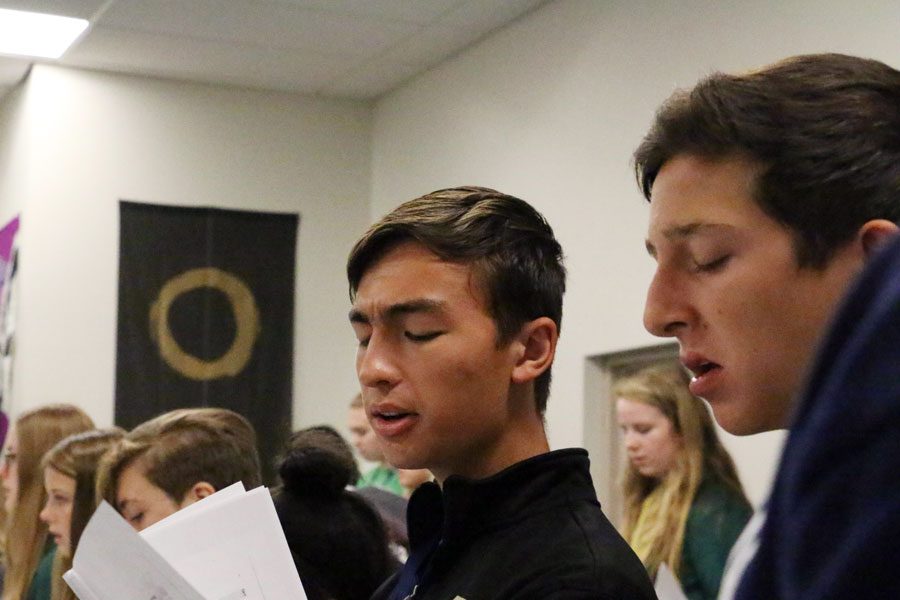Senior earns perfect ACT score
Nick Grill plans to pursue engineering or STEM career
Senior Nick Grill, at left in choir class last year, earned a perfect score on the ACT.
For some students, math remains a struggle. Witness the placement of math teacher in the language support room every period and the math open gym sessions on Sundays, where teachers give up hours of their weekend to assist their students.
Grasping the intricacies of relationships between mathematical principles do not come easy to some. Nevertheless, some stand out in their numerical affinity.
Senior Nick Grill has developed his mathematical knowledge from an early age, and it has allowed him to take significantly more advanced math classes through an independent study course through Ball State University.
Grill attended Avon Middle School and took the same classes as everyone else – until sixth grade. The online math course “Ascend” was a tool offered to students starting at sixth grade, and Grill completed all the material provided him through the online course. Teachers gave him an algebra test, and his proficiency on the exam allowed him to skip to geometry the following year. By the time ninth grade rolled around he was ready for precalculus.
He said that when he was in a class that was usually full of juniors and seniors, “Everyone was very welcoming and Mr. Thompson, who used to teach here, was really nice about it.”
The parental influence was strong for Grill. With parents who are chemical engineers, he said that they taught him how to analyze numbers. Grill said, “I think my teachers had a good part in it, but I remember always doing math flash cards with my parents. It was always rooted in my brain. I could always kind of pick it up.”
The early exposure provided one of the most important parts for achieving a strong base to build upon. Grill now takes an independent study course utilizing videos from a Ball State professor and a textbook to learn multivariable calculus and differential equations.
He said that this year he’ll take linear algebra and statistics through the same Ball State program.
The degree of mobility and study skills to learn at the rate you want to have “for sure help carry over,” he said, into other topics. In IB physics Grill was able to use what he learned about differential equations to apply to circular motion in his physics class. “I could see it was really integrated and it was cool to see how it blended into other subjects,” said Grill.
Grill said, “I think math isn’t invented, it’s discovered. We’re always finding new ways to represent it in ways we know how to, and that’s pretty beautiful.”
Unsurprisingly, Grill’s hobbies have a heavy analytical focus. When he saw his dad coding one day, Grill was interested enough to get some books and teach himself, and now codes as a hobby in Python and Java in his free time. Grill said he and senior Henry Eifert competed and won the Evansville Coding Competition, which was sponsored by the University of Evansville.
Contestants received six problems to complete in three hours. Grill and Eifert were able to finish five problems, but were three seconds late in submitting the sixth and final question. Grill said, “One of the problems might be a user would input a string and the output would be a different string. For example, you would enter a letter and then the output would need to be six places ahead of that letter. You would write code that morphs the input into the output.”
Music is another hobby of Grill’s. He reaffirms the idea that math and music are related, especially after his experience taking AP Music Theory.
“Last year I took AP Music Theory and I thoroughly enjoyed it. I think it might’ve been my favorite class at Cathedral. I thought it was really numerical and analytical, and the math part of my brain really coincided with it. A lot of music theory stuff is patterns and different combinations of half steps and whole steps and how they build on each other. I think it really is mathematical and numerical.”
For the future, Grill says he might pursue either physics or computer science, and is considering a minor in music theory.
Taking in all the ways logical and analytical thought plays a part in his life, Grill said, “Learning math has really taught me how to be more logical. Something has to come from something else; there’s always this pattern of cause and effect.
“You can’t jump from one thing to another. Every time you try to solve an equation, there’s always a set order you have to follow and you can’t just have random steps. I try to find a logical order, and try to stay grounded in those solutions.”
Grill went beyond that bar and achieved perfection in the form of a 36 on the ACT.
When informed of his perfect score, Grill said, “I was ecstatic and relieved, because I knew I would be done with standardized testing for the rest of the year, and I knew it would open up college opportunities for me.” Grill said that he wants to explore the STEM and engineering fields in the future.
As for the rest of us, Grill’s advice is, unsurprisingly, to prepare. Grill started studying at the beginning of June for a test date in the middle of the month. He said, “Study early and study often. Not just a couple of days before the test. Take a couple of weeks before and go through the material through.”

Andrew de las Alas is a senior and reporter for the Megaphone. He runs varsity cross-country, is co-captain of the speech and debate team and co-president...







